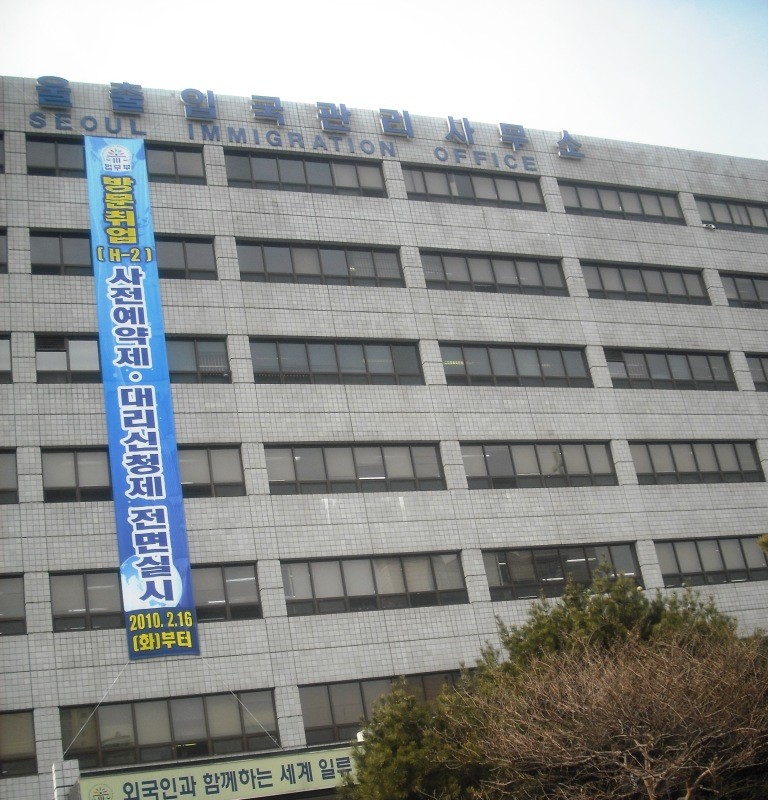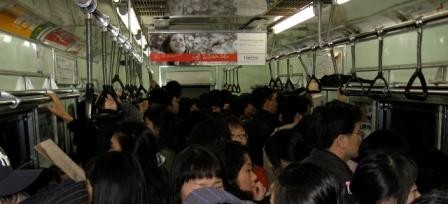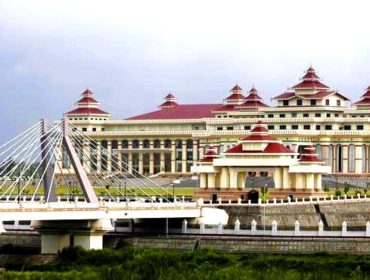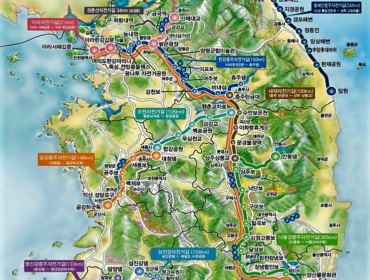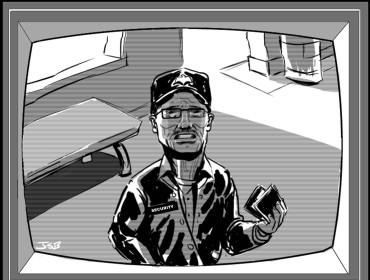By Iwazaru
An indelible part of the expat experience anywhere is dealing with the red tape of immigration. You are, first and above all else, a foreigner in a foreign land; a guest in someone else’s house (it is a privilege). And there are a lot of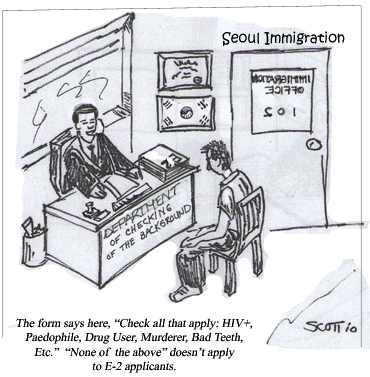 different houses, in different places with different rules and regulations. The Korea Immigration Service is the patriarchal powerhouse in the Land of the Morning Calm and it wields a heavy club to deal with anyone whom steps outside of a labyrinthine list of edicts. One does not want to stir the ire of the master of the house.
different houses, in different places with different rules and regulations. The Korea Immigration Service is the patriarchal powerhouse in the Land of the Morning Calm and it wields a heavy club to deal with anyone whom steps outside of a labyrinthine list of edicts. One does not want to stir the ire of the master of the house.
Having lived in Korea for more than five years, I had come to believe that the process of renewing my visa would become somewhat robotic, a simple repetition of that which had been done the previous year. I’d already provided my college diploma and transcripts during my first run and I was staying at the same school and living in the same apartment. I hadn’t had any problems with the law and had gotten on quite well with the locals. Things were just fine. That is until a pedophile by the name of John Mark Carr was nabbed in Thailand and later found to have taught in Korea. (Interestingly, it seems like all the stories referring to Carr by name that led the local press at that time have disappeared.) Then Christopher Paul Neil, another pedophile wanted by Interpol for sexually abusing boys in Thailand and Cambodia, was apprehended in Thailand and later sentenced to more than three years in a Thai prison (this was extended by six years following another conviction). He also taught in Korea.
On cue, in late 2007, the Ministry of Justice, under which the Korea Immigration Service falls, issued a decree calling for all E-2 visa applicants and holders to undergo criminal background checks and to submit to HIV and drug tests (there was not any legislation in the National Assembly; they called it a “policy memo”). The concept itself mostly made sense; keep the children away from convicted rapists and murders. Yet, the myopic application of the policy plus the inclusion of HIV and drug tests was bewildering. First, only E-2 holders were subject to the background checks even though there were thousands of other foreigners with different status visas teaching children: those married to Koreans; those here studying (and teaching); overseas Koreans returning to their motherland.
The HIV tests took on a darker guise as the country blackballs and deports anyone with the disease. Even Korean citizens find themselves fighting much more than a disease–they are treated like lepers. Drug tests posed another issue because it seemed that Immigration was stereotyping all E-2ers as pot-smoking, pill-popping, line-snorting miscreants. To add insult to injury, Korean teachers are not subjected to any such tests. Unsurprisingly, the Korea Immigration Service has a different take: “Each country has the right to request what qualifications a foreigner needs to work in their country. Dozens of countries around the world have visa restrictions on foreigners regarding HIV/AIDS,” said an official with the Immigration Service. Their house, their rules, however Byzantine. It basically crumbled down to, “if you don’t like it, leave.” There was the expected carping from inconvenienced teachers and some constructive criticism from the Association for Teachers of English in Korea (ATEK). (In little more than a year of existence ATEK has been the target of attacks.) Additionally, Benjamin Wagner, a law professor here and U.S. attorney, came out vehemently against the regulations (there is an excellent interview here). Little heed has been paid to the complaints.
Thus some months after the loose policy script had been written, I found myself beginning the whole show when I contacted the state police in my home state. I figured I was free and clear because I am not a rapist or a murderer (and drugs aren’t on my current to-do list). I surmise this whole thing is about keeping kids safe.
Anyway, I got a big file of papers—no, not the FBI check—which included a letter from the chief and copies of any relevant documents which added up to more than ten pages. I naively presumed that if they wanted the stuff, I’d give it to them. Once I had that, I headed to the U.S. Embassy, waited in the backwoods-bus-station-like waiting room for more than an hour, turned over the documents, paid $30 (45,000won) and waited more than 30 minutes for the lady behind the Plexiglas to hand back the bound and stamped packet with a snide, “good luck.” I didn’t get it until I glanced at the official stamp that stood over a statement that went something like, “We are not in the position to verify any of this information…” Uh-oh.
After that, I was off to get my “full” health check at Hanyang University Hospital and it was a show. The “waegukin” welcoming crew was around every corner but the hospitality was confined to glares and whispers. If I didn’t understand Korean to some degree, I would have been lost at door one. When I inquired in Korean, they just pointed across the room where I ended up paying around 80 thousand won for a hospital card and a checkup that included a vision test, a hearing test, and a Q&A session with the doctor where he asked questions about how much alcohol I drink in a week and how many surgeries I’ve had.
My hospital tour was next and I was led by a kind older woman around the hospital like someone might lead an exotic animal through the neighborhood. Blood tests for AIDS and venereal diseases among others came first. I then filled two cups for all the necessary reasons. Next was my chest X-ray where the technician asked the women if I was her “namja chingu”* with a chuckle which livened up the idle crew. Lastly, I was presented to the “dentist” who seemed to stall just to soak up the moment. He and the woman went on and on as he bragged about “handling” all the foreigners and how the new immigration policy was a good thing (“foreigners need to be checked,” he said) while I sat and thought: “What the hell do my teeth have to do with my teaching? If I have a toothache, I go to the dentist. Doesn’t everyone?” Finally, I was in the chair where he attempted to work his English skills to no avail while asking me to open wide so he could look at my teeth. His only relevant question was, “So no problem?” I shook my head and thus ended my examination.
A few days later I nervously returned to the hospital wondering what might have come up. I collected my queue number and waited with an elevated heart rate. When I was called, the nurse slowly and carefully lifted up the cover sheet and seemed to squint at the results (perhaps she needed a vision test). I felt myself flush and sweat began forming on my forehead. “You are okay,” she said, still looking at the paper as if there still could be something wrong. I didn’t feel “okay” until I’d turned in my passport photos, picked up my two copies and gotten a safe distance down the road. A clean bill of health is supposed to be a relief.
My last step was to visit far western Seoul where the Seoul Regional Headquarters sits not far from Omokgyo Station on subway line number 5. Always get there early. I arrived before lunch, went out and had lunch, returned and waited about another three hours until I was called (stay on your toes because once they call a number you often have less than five seconds). My heart  started pounding and a light film formed on my palms as I sat down in front of a gray-haired official with a stern look on his face. I handed over my documents and the gray-haired fellow flipped nimbly through everything until the criminal record where he slowed to a crawl asking himself, “What’s this?”
started pounding and a light film formed on my palms as I sat down in front of a gray-haired official with a stern look on his face. I handed over my documents and the gray-haired fellow flipped nimbly through everything until the criminal record where he slowed to a crawl asking himself, “What’s this?”
After asking me what some of the documents were he began to jot down translations and eventually seemed bemused by this career criminal he was reviewing. That’s when he pulled a passing female official aside to marvel at my criminal record that consisted of two under 25 mph speeding tickets issued more than 10 years ago and a few alcohol related violations earned while I was in high school and college. They poured over the pages for a minute after which she glared at me and said, “You have a big problem!”
I did what I learned to do when I was harassed by Immigration several years ago for doing a free add for a newspaper education program that provides free papers for students. I prostrated myself as best as possible—shoulders slumped, head down—and the truth is I actually felt abashed so it wasn’t really a stretch. After some time the man sent her off and disappeared into the area behind him where documents are perused and passports processed; the Big Man also lingers there and I presume that’s who he’d gone to see. My life here flashed in front of me: never a lick of trouble; a fairly strong and consistent work history (more than five years at one school); fine social standing— basically a life built up that might just be torn down.
Then almost as soon as he’d vanished, he appeared, sat and said, “You have no problem— it was a long time ago.” Then I was on some kind of fast track as I had my passport back in hand in less than 15 minutes. I can only imagine one of two things: 1) I have been in Korea for a fairly long time with no problem and thereby pose no threat. 2) Because the Man actually realized the pettiness of my record. Nevertheless, I came to further realize that I am not the only one with a problem— every E-2 or potential E-2 holder has the same problem.
The question remains as to why it is just E-2ers and why AIDS and drug tests are part of the plan. (I suspect the same pigeonholing is going on: unsafe, casual sex + drug use= foreigner.) For from a Korean view it isn’t completely errant to view foreigners as purveyors of casual sex and drugs given the image that modern Western films and music sell combined with the focus that the Korean media puts on any criminal behavior perpetrated by the waegukin crowd. What is alarming is when such exaggeration and hyperbole lead to hasty implementation of invidious policies. For now, and perhaps forever, everyone has the free choice to play by the Man’s rules, hit the road for a new house or head home where some rules don’t make much sense either.
*On a final, positive note I would like to commend the Korean Immigration Service for making long necessary improvements to the Seoul Regional Headquarters operations and facilities. In years past there was little to no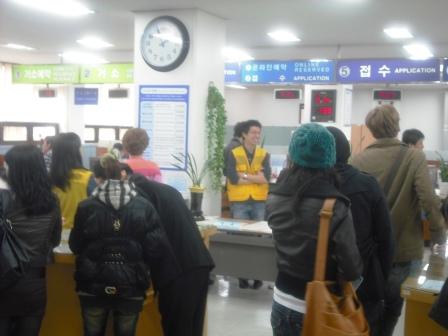 assistance offered for those new to the process and the forms that fill the slots in the standing tables. On the day when I visited in February there were three volunteers in yellow vests assisting the confused in several languages. I spoke with one of the volunteers, Mr. Kim, a gregarious and lively fellow, who said the program was less than a year old and was in need of some more volunteers. During my lengthy wait I observed the three help many people with enthusiasm and kindness (ingredients that make dealing with bureaucracy almost tolerable).
assistance offered for those new to the process and the forms that fill the slots in the standing tables. On the day when I visited in February there were three volunteers in yellow vests assisting the confused in several languages. I spoke with one of the volunteers, Mr. Kim, a gregarious and lively fellow, who said the program was less than a year old and was in need of some more volunteers. During my lengthy wait I observed the three help many people with enthusiasm and kindness (ingredients that make dealing with bureaucracy almost tolerable).
Moreover, for those in need of some air or a smoke, there has always been an area outside if you take a right out the entrance. Now there is a digital screen out there that displays the ticket numbers that are called. Little things make big differences. And if you are set to spend some hours at the Headquarters, there is a great park just across the road to lower your blood pressure; I always head there for a stroll.
____________________________________________________________
*Namja Chingu means boyfriend
Thanks to Lee Scott for cartoon.
 Print This Post
Print This Post



